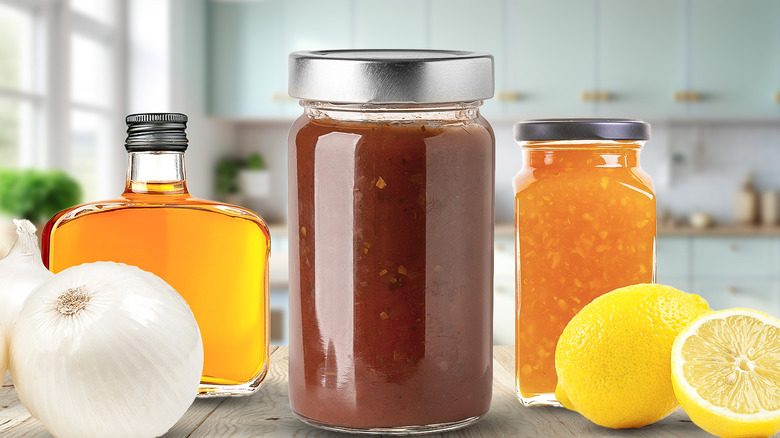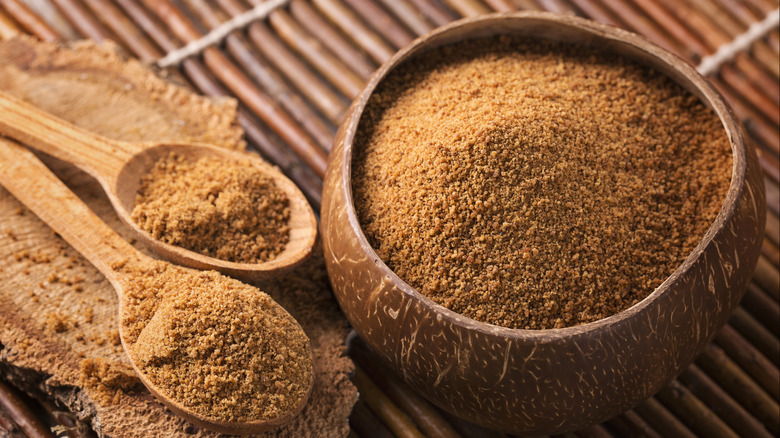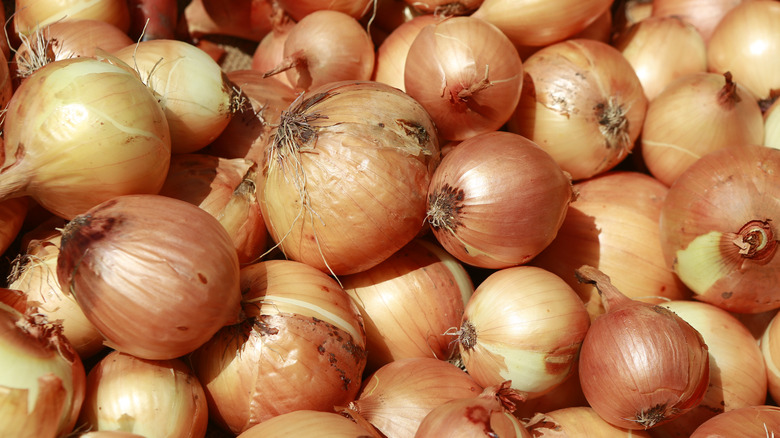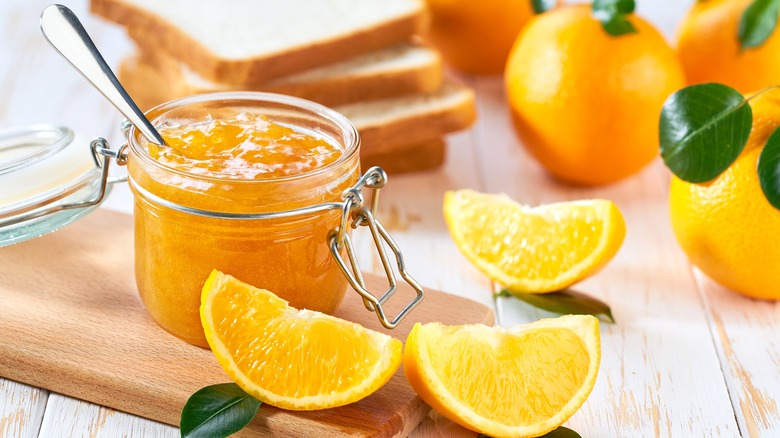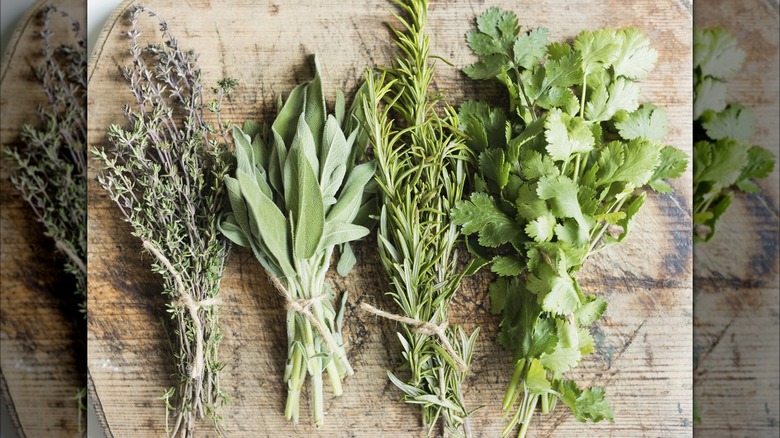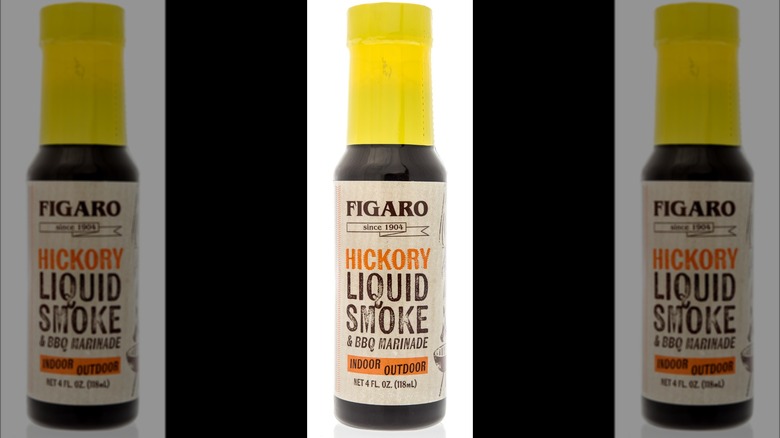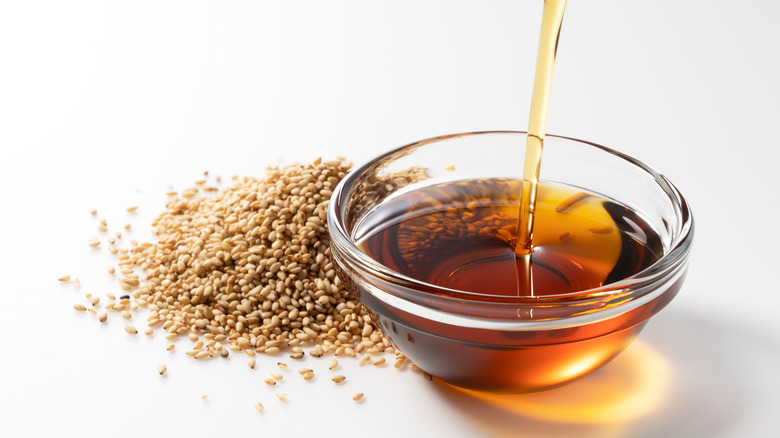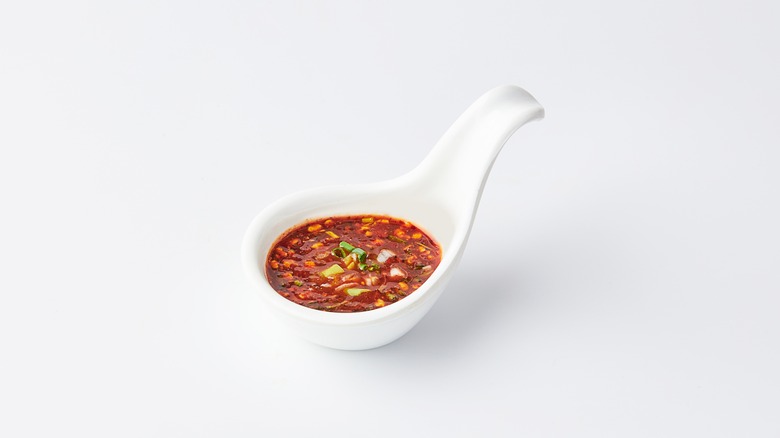We Asked 3 Experts How To Upgrade Store-Bought BBQ Sauce. Here Are Their Tips
If you own a grill, go out of your way to taste the perfect slab of baby back ribs, are more than happy to argue whether barbecue is better in Texas or Kentucky, or spend hours smoking the perfect brisket, odds are you're a barbecue fan. You probably even have a few different recipes for homemade barbecue sauce that you can whip up in a snap.
But what if you're in the mood for some pulled pork or a zesty barbecued chicken and barely have time to grill those proteins, let alone whip up the barbecue sauce to slather on top? What if all you have time for is a bottle of premade barbecue sauce? Sure, it may not be your first choice, but with so many different barbecue sauce options out there, it'll work in a pinch, and at least you'll get that barbecue you're itching for.
Well, turns out there's actually a way you can transform that store-bought bottle into something that tastes gourmet. Something that your friends and family would swear you spent hours mixing up. Something that might even be better than your usual homemade version. Impossible? We spoke to three chefs who believe it can be done — as long as you have the right ingredients.
Palm sugar
"People should start incorporating palm sugar into their [barbecue] sauces," says Battambong BBQ's Chad Phuong. If you're unfamiliar with palm sugar, it's a sugar that doesn't come from sugar cane but rather from the sap found in flowers from certain types of palm trees. Similar to maple syrup, the sap is boiled down until it's the perfect, usable consistency. Then, it's transformed into a solid brick or granules to be measured and sprinkled into your favorite recipes. Recipes like cookies, cakes, or barbecue sauce.
Phuong, the self-proclaimed Cambodian Cowboy, tells us "it's a delicious substitute for regular sugar" because not only does it have hints of coconut, but its rich flavor melds well with flavors that are "similar to brown sugar and molasses." But if you're worried that you won't be able to find this unique ingredient, don't be. The Texas-style pit master promises that we can find palm sugar in all its forms at Asian grocery stores, Whole Foods, and maybe even your favorite supermarket.
Onions
A key ingredient in the trio that makes up mirepoix, onions aren't just important for that mixture; they're the base of many recipes, from soups to risotto, because of their distinct flavor. So, it comes as no surprise when Kevin Bludso, the chef behind Bludso's BBQ, tells us that he likes to add them to barbecue sauce. But onions are just part of his recipe. He also adds Sriracha and garlic, and lets that combination marinate for 24 hours. The end result is a barbecue sauce that is way better than anything you'd find in a bottle.
"The minced garlic and onions provide a crisp texture to complement the meat, and the Sriracha boosts up the tang and heat," explains Bludso. But the onions don't just improve the texture of the sauce; they can help thicken it as well.
While Bludso recommends adding raw onions to barbecue sauces, if you're looking to add a sweet and savory element, you could grill the onions first instead. This will take away the harshness of the onion while adding a delightful smokiness that will enhance the smokiness of your grilled proteins.
Orange marmalade
Back when Steven Raichlen was just starting on his road to becoming a barbecue master, he released a book called "The Barbecue! Bible." In it are all the recipes you'd need to become a pretty darned good pit master. However, not all the recipes are dedicated to learning the ins and outs of grilling produce and proteins. There are also plenty of recipes for marinades, salsas, and sauces; barbecue sauces. One of those sauces is dedicated to his wife, Barbara. "I call it Barbara's Barbecue Sauce," the famous chef tells us when we sit down with him at the Alisal Ranch during his annual BBQ university.
This sauce goes way back, "before we were all so sophisticated," he continues with a chuckle. Raichlen would take a bottle of barbecue sauce and simply add honey and orange marmalade. It may sound like an odd combination, but Raichlen swears that honey and orange marmalade are not only "super easy" ingredients to add, but they make the sauce a "little sweeter" while adding a touch of bitterness — thanks to the orange peels that are used to make up the jam. Better yet, they're ingredients you can find anywhere and probably already have sitting on the shelf.
Lemon zest
If there's one thing you should always keep in your refrigerator, it's citrus. Lemons, limes, and oranges not only make great juices, but they can also be used in plenty of recipes, both savory and sweet. Their juices can be used to add a little zing to sauces and dressings, while their zests are often used to brighten up entrees and desserts.
But we're not the only ones who think so. Steven Raichlen agrees. In fact, you'll find this ingredient in recipes throughout all of his books. While he uses all forms of citrus, lemon zest is his favorite. "Lemon zest is one of those ingredients [where] for me, almost anything is improved." Even barbecue sauce.
But it's not just lemon zest. He feels the same way about lemon juice as well. Raichlen is such a big fan that he calls lemon zest the "miracle ingredient." No matter how you use it, "it's like instant brightness," he explains. We're big fans, too, and not just because of its bright flavor. One of our favorite characteristics about these ingredients is that a little goes a long way.
Fresh herbs
Fresh (or dried) herbs are another magic ingredient. They can completely change the flavor of a dish. Something that's bright and acidic can suddenly get some earthy notes with just a teaspoon or two. While you'll typically find herbs listed in salads or entrees, barbecue maven Steven Raichlen says they can be added to barbecue sauces as well. You might be surprised that the chef would pick herbs over the numerous spices available, but he says the only reason he opts for the greenery is "because chances are the bottled barbecue sauce already contains paprika, garlic powder, [and] onion powder."
With so many herbs to choose from, we were curious which ones the pit master would pick to add those bright herbal notes to his barbecue sauce. We were sure that rosemary, parsley, and thyme would be on his list, but we were genuinely surprised when he mentioned tarragon. "I'm on a real tarragon tag these days," Raichlen explains. Tarragon, which he says has a distinct licoricey flavor, would definitely be an interesting addition, especially if you're using that barbecue sauce on chicken or lamb.
Liquid smoke
Even though there are plenty of smoky bottled barbecue sauces out there, we were wondering if it would be possible to turn a premade sweet or spicy barbecue sauce into a smoky delight. It's no surprise when Steven Raichlen says it's totally possible. But out of all the ways to do it, we never, in a million years, expect him to mention liquid smoke.
Raichlen is one of the biggest barbecue masters around, so when he says to use a bottle of liquid smoke, our jaws hit the floor. Even he admits that he's uttering a "heresy." But it turns out using this ingredient isn't as out there as you'd think, especially since the famous chef reveals that it isn't all chemicals and additives.
"It's a natural product made by smoking wood, gathering the smoke, and just dissolving [it] in water," the chef explains. Before liquid smoke, Raichlen says that your only choices were either sweet or tomato-based barbecue sauces. Now, you can find smoky sauces everywhere. But the benefit of adding your own smoke to a bottle of barbecue sauce is that you get to decide just how smoky you want your sauce to be rather than relying on a premade bottle that could turn out to be too smoky.
Liquor
We all know the numerous ways that liquors can be imbibed, from neat or on the rocks to fancy, garnish-clad cocktails. But spirits don't have to be limited to a tall glass filled with ice. Just about any spirit can also add amazing flavor to desserts, dressings, soups, and sauces. A chardonnay, for example, might add buttery notes to a rich risotto, while bourbon tends to add a hint of caramel and vanilla to gooey pecan pies. So, since we love adding a splash or two of certain spirits to our dishes, we wondered if we could add them to barbecue sauces as well. Steven Raichlen says you absolutely could. But as with all ingredients, some spirits are better than others.
While the barbecue master says that both rum and bourbon are "good" barbecue options, he mentioned a liqueur that we never even considered: sambuca. According to Raichlen, the same after-dinner drink commonly served in snifter glasses with three coffee beans makes a very enticing sauce. "I make a sauce," the chef says. "It's a lemon, brown sugar barbecue sauce. And the secret ingredient in that is a shot of sambuca," he continues. "So, it's got liquoricey sort of undertones that are very beguiling," Raichlen adds. But since sambuca is a sweeter liqueur, the barbecue master recommends adding it to a smokier barbecue sauce because "if you [already] have a really sweet barbecue sauce, you don't really want to add anything to make it sweeter."
Sesame oil
Oil is one of those essential ingredients one should always stock in one's cupboard. Olive oil and vegetable or canola oil are absolutely vital, but after that, you can add whichever oils you prefer, from avocado to peanut. If you have an affinity for Asian foods, we'd recommend a bottle of sesame oil as well. Even though it has a lower smoke point than peanut oil, it's a great addition to fried rice, stir-fries, and sautees, thanks to its subtle nutty flavor.
Unlike other oils out there, sesame comes in two different types: raw and toasted. The raw is lighter in color and has a more neutral flavor, so it's great for almost any type of cooking. Toasted sesame oil is darker in color and has a nuttier, toastier flavor — which is why you'll frequently find it in so many Asian recipes and why Chad Phuong recommends "adding a few tablespoons of sesame oil" to any bottle of barbecue sauce. He says the addition is "very aromatic" and adds a nice "umami flavor to your barbecue sauces."
If you don't have any on hand, don't fret. Phuong says you can find it at most Asian grocery stores, Whole Foods, and even your favorite supermarket. But if you don't really want to run out to grab a bottle of cooking oil, you can make your own at home with just two ingredients.
Thai chili sauce
We're big fans of sweet and smoky barbecue sauces, but we know there are those who like their barbecue to have a little extra kick as well. While you could just add a teaspoon or two of ground pepper to that bottle of store-bought barbecue sauce, Chad Phuong says Thai chili sauce is the way to go. He doesn't use the Thai chili sauce all on its own, though. He adds a little smoked habanero as well to up the ante.
Before you run to your nearest Asian market for these extra ingredients, the chef tells us there's a little more to this recommendation than simply adding a teaspoon or two of the chiles to your favorite bottled barbecue sauce. Phuong recommends blending the two ingredients together, straining it, and then heating the mixture up in a small saucepan over medium-low heat for 15-20 minutes. Once the flavors have had a chance to meld, add it to that bottle of barbecue sauce, and "the heat is on," exclaims the self-proclaimed Cambodian Cowboy, referencing the Glenn Frey song from the '80s. "Not on the street, but on my delicious smoked meats," he adds with a smile.
